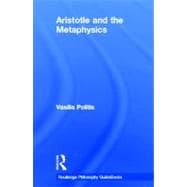
Note: Supplemental materials are not guaranteed with Rental or Used book purchases.
Purchase Benefits
What is included with this book?
| ACKNOWLEDGEMENTS | ix | ||||
| 1 Aristotle's Metaphysics | 1 | (22) | |||
|
1 | (4) | |||
|
5 | (5) | |||
|
10 | (2) | |||
|
12 | (4) | |||
|
16 | (3) | |||
|
19 | (2) | |||
|
21 | (2) | |||
| 2 Metaphysics as the Science of the Ultimate Explanations of All Things (Book I) | 23 | (41) | |||
|
23 | (8) | |||
|
31 | (8) | |||
|
39 | (11) | |||
|
39 | (3) | |||
|
42 | (6) | |||
|
48 | (2) | |||
|
50 | (14) | |||
|
50 | (5) | |||
|
55 | (6) | |||
|
61 | (3) | |||
| 3 Aristotle's Method in Metaphysics (Book III) | 64 | (26) | |||
|
64 | (11) | |||
|
75 | (4) | |||
|
79 | (4) | |||
|
83 | (7) | |||
| 4 Metaphysics as the Science of Being Qua Being. Primary Being versus Non-Primary Being (Books IV. 1-2 and VI. 1) | 90 | (32) | |||
|
90 | (4) | |||
|
94 | (9) | |||
|
103 | (7) | |||
|
110 | (8) | |||
|
118 | (4) | |||
| 5 The Defence of the Principle of Non-Contradiction (Book IV. 3-6, esp. 3-4) | 122 | (34) | |||
|
122 | (4) | |||
|
126 | (2) | |||
|
128 | (4) | |||
|
132 | (3) | |||
|
135 | (3) | |||
|
138 | (8) | |||
|
146 | (4) | |||
|
150 | (3) | |||
|
153 | (3) | |||
| 6 The Response to Phenomenalism and Relativism (Book IV. 5-6) | 156 | (32) | |||
|
156 | (5) | |||
|
161 | (4) | |||
|
165 | (3) | |||
|
168 | (13) | |||
|
168 | (3) | |||
|
171 | (7) | |||
|
178 | (3) | |||
|
181 | (7) | |||
| 7 The Search for Primary Being (Book VII) | 188 | (69) | |||
|
188 | (5) | |||
|
193 | (4) | |||
|
197 | (1) | |||
|
198 | (5) | |||
|
203 | (54) | |||
|
203 | (4) | |||
|
207 | (6) | |||
|
213 | (4) | |||
|
217 | (4) | |||
|
221 | (9) | |||
|
230 | (7) | |||
|
237 | (4) | |||
|
241 | (10) | |||
|
251 | (3) | |||
|
254 | (3) | |||
| 8 The Ultimate Cause of Change: God (Book XII) | 257 | (38) | |||
|
257 | (5) | |||
|
262 | (4) | |||
|
266 | (3) | |||
|
269 | (3) | |||
|
272 | (3) | |||
|
275 | (3) | |||
|
278 | (3) | |||
|
281 | (7) | |||
|
288 | (2) | |||
|
290 | (2) | |||
|
292 | (3) | |||
| 9 The Criticism of Plato's Theory of Forms | 295 | (36) | |||
|
295 | (8) | |||
|
303 | (4) | |||
|
307 | (6) | |||
|
313 | (5) | |||
|
318 | (5) | |||
|
323 | (6) | |||
|
329 | (2) | |||
| Conclusion | 331 | (2) | |||
| FURTHER READING | 333 | (3) | |||
| BIBLIOGRAPHY | 336 | (5) | |||
| INDEX | 341 |
The New copy of this book will include any supplemental materials advertised. Please check the title of the book to determine if it should include any access cards, study guides, lab manuals, CDs, etc.
The Used, Rental and eBook copies of this book are not guaranteed to include any supplemental materials. Typically, only the book itself is included. This is true even if the title states it includes any access cards, study guides, lab manuals, CDs, etc.